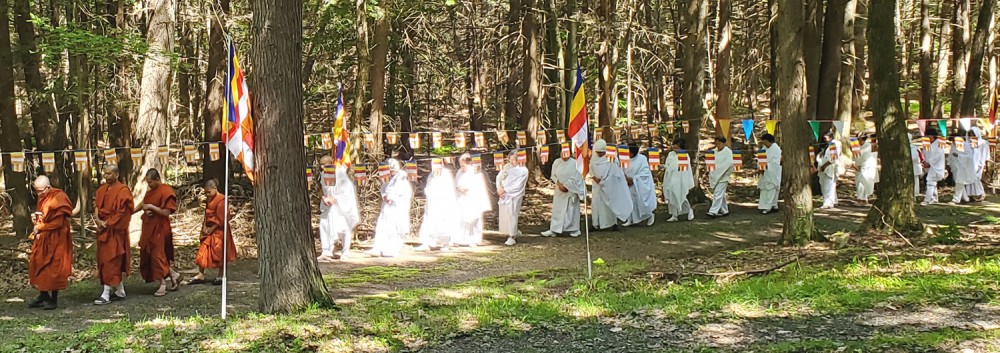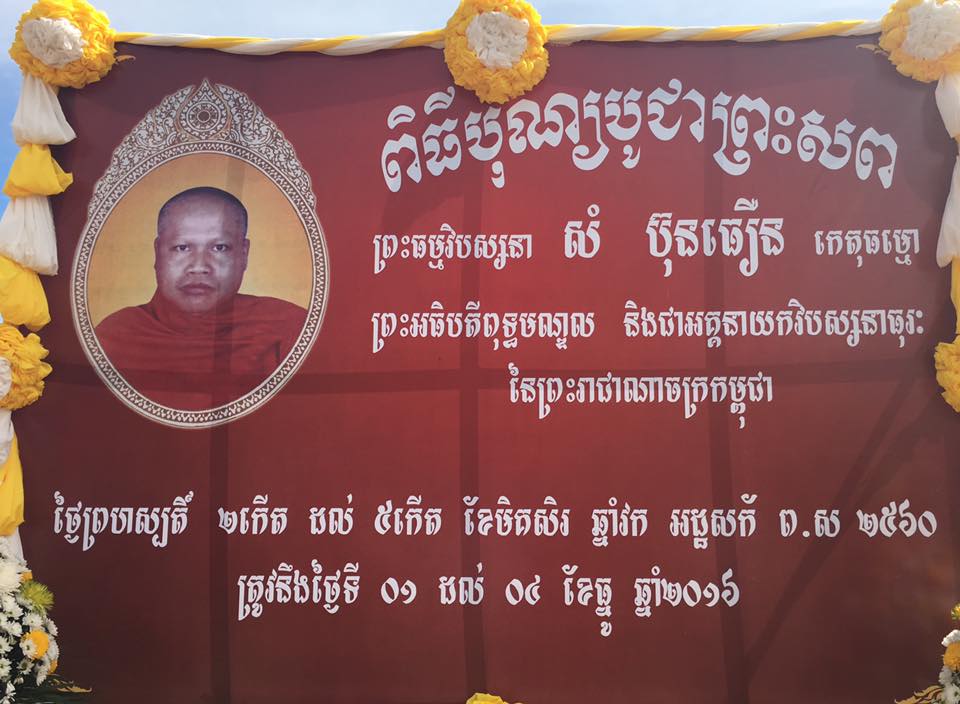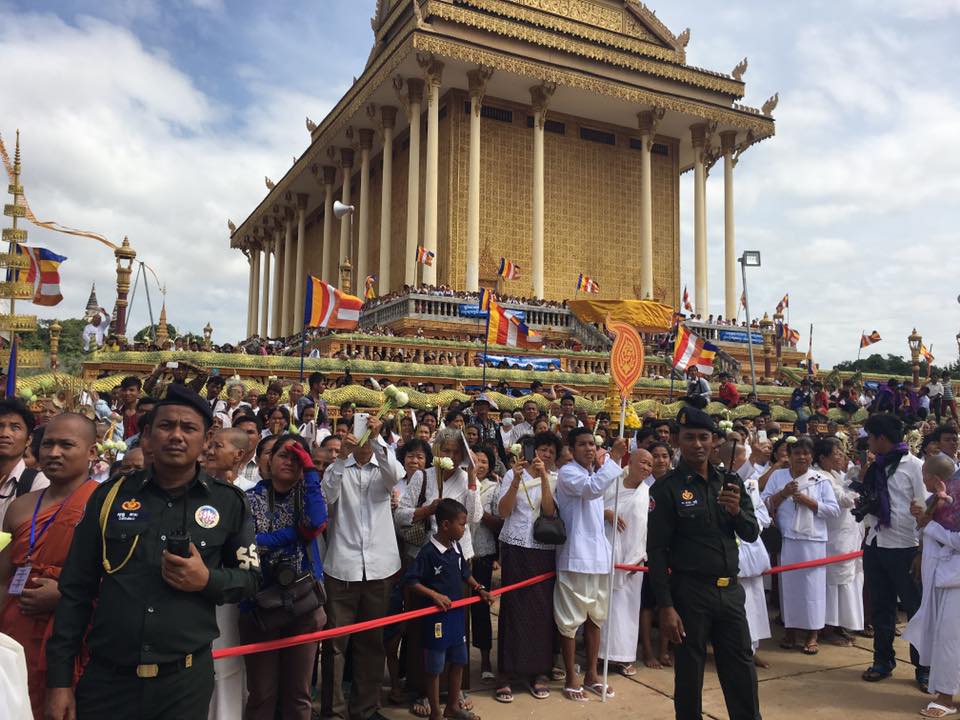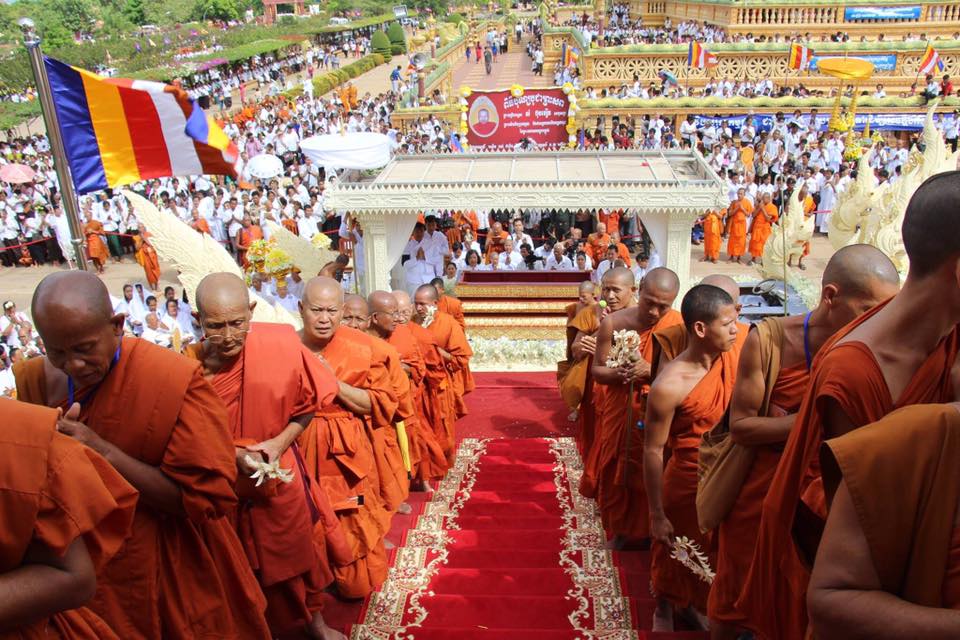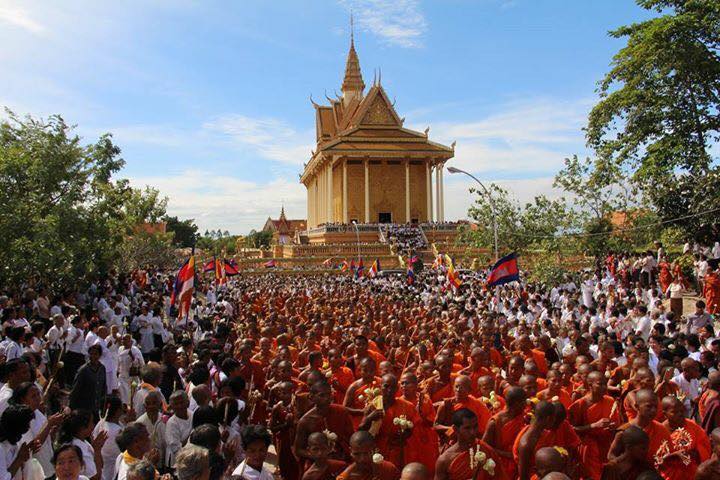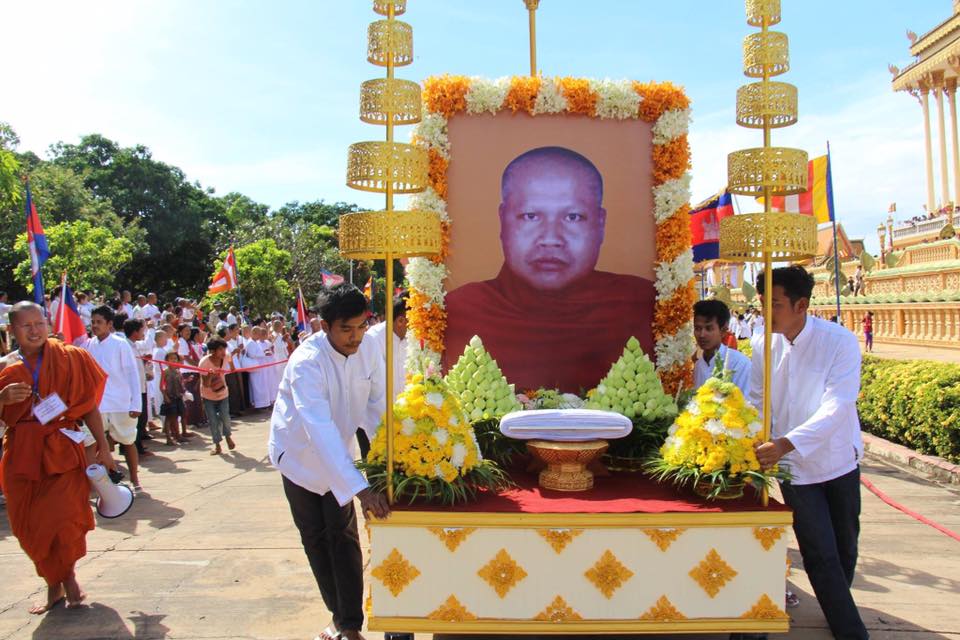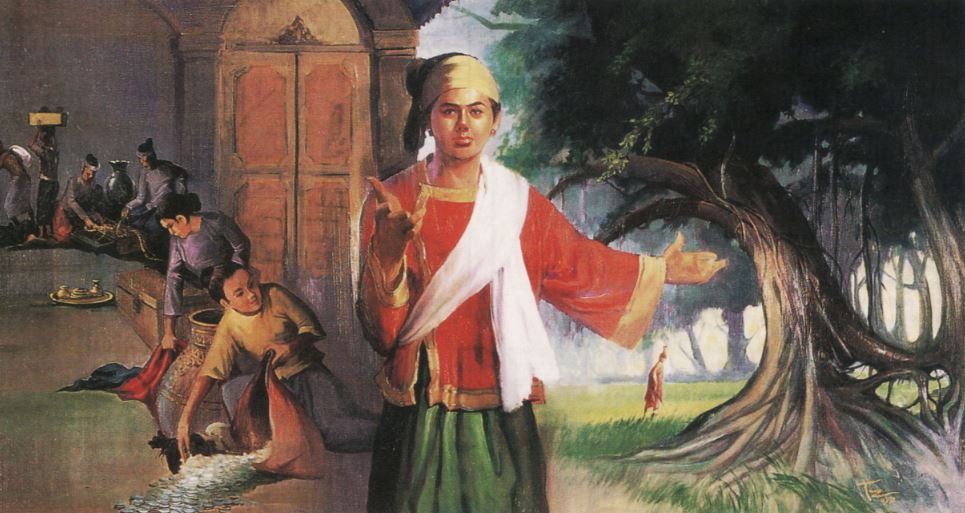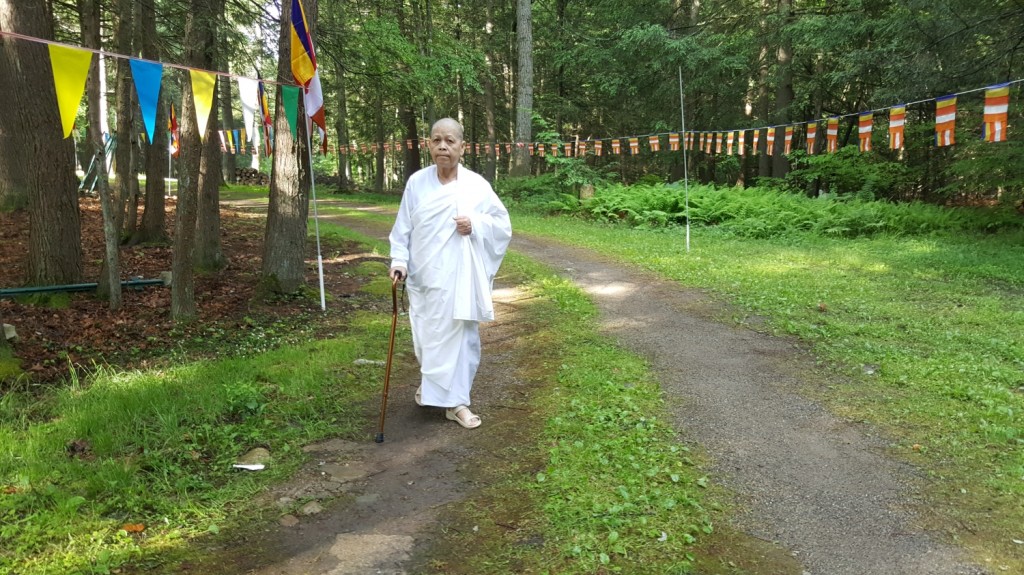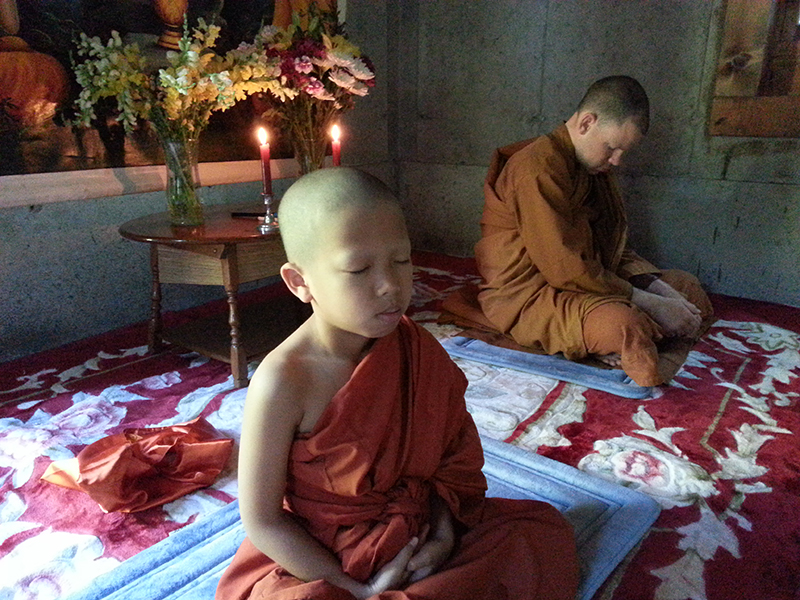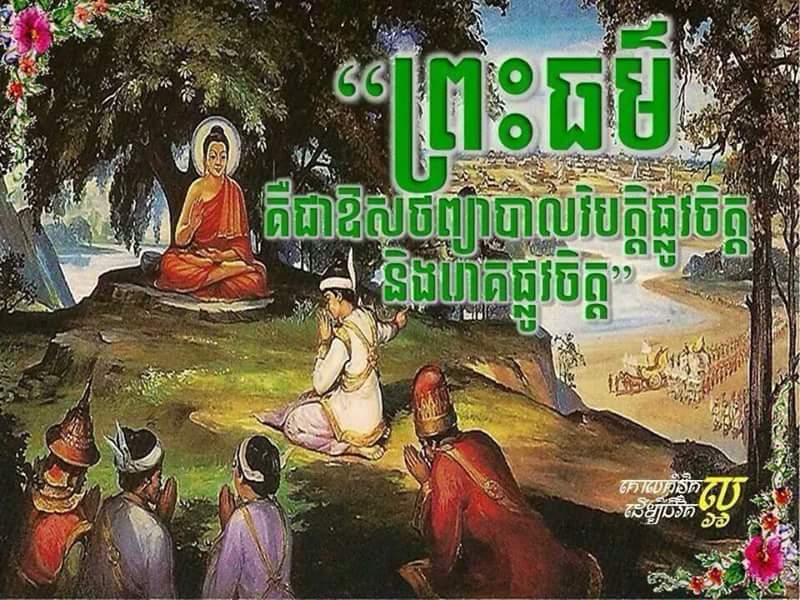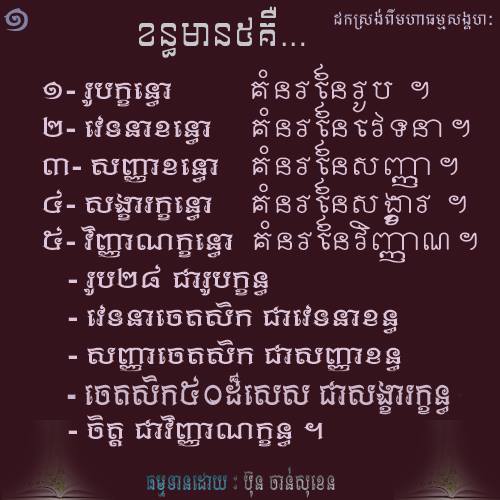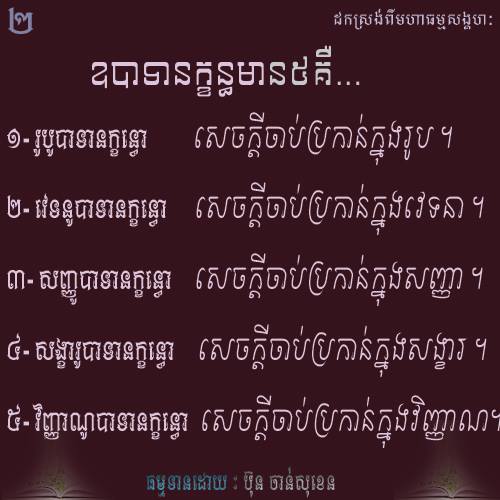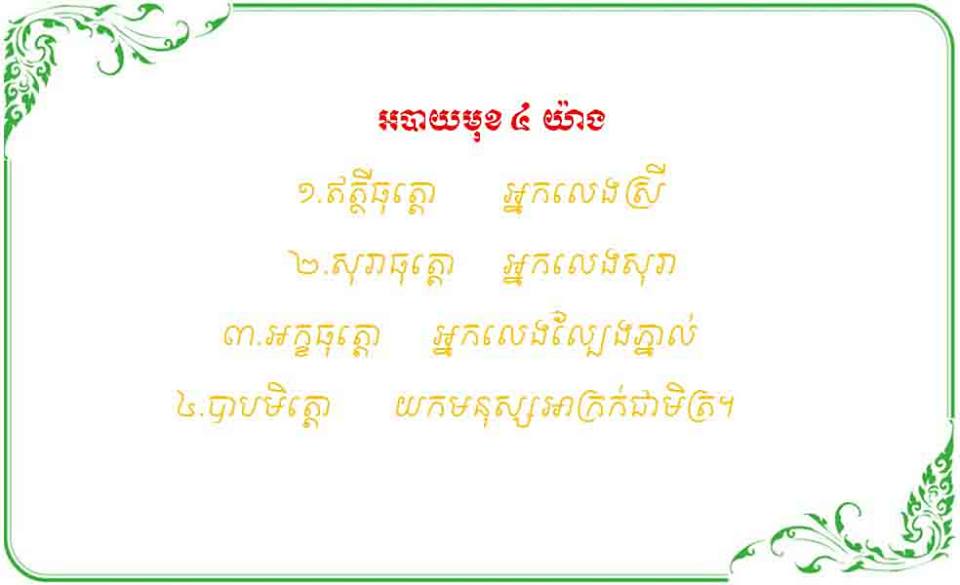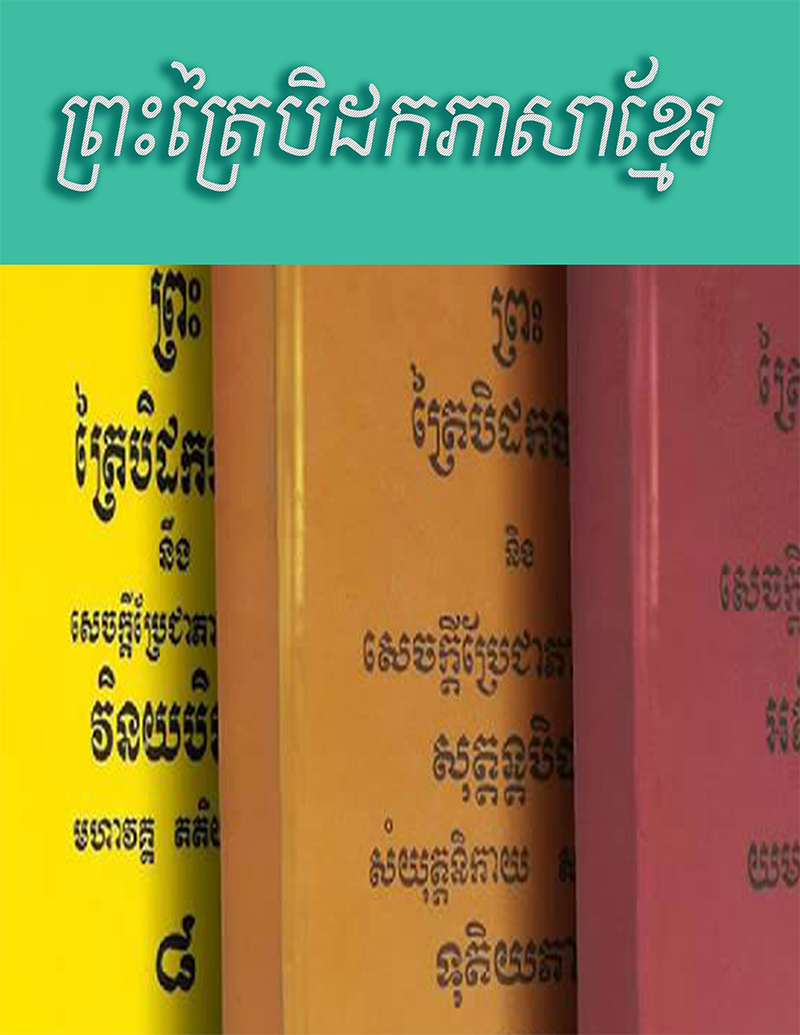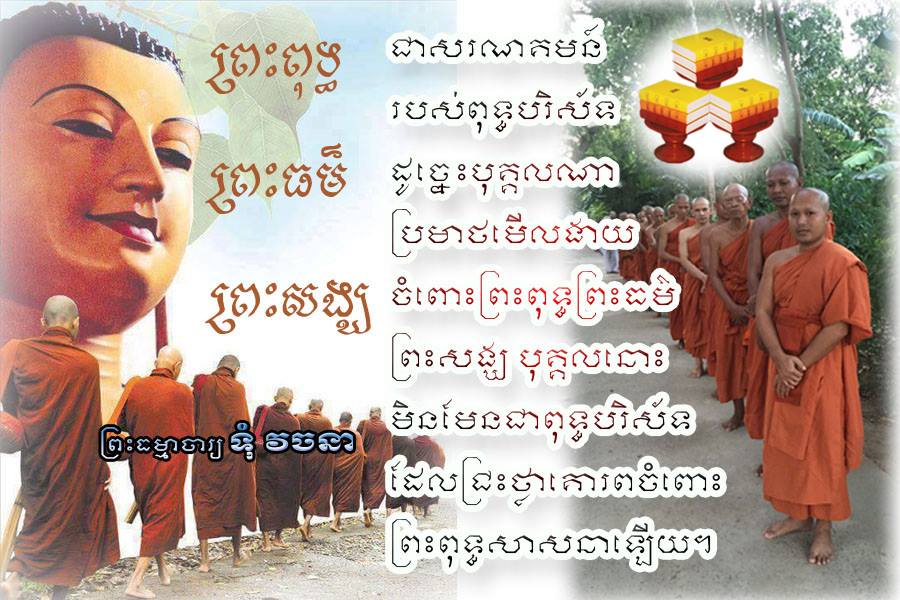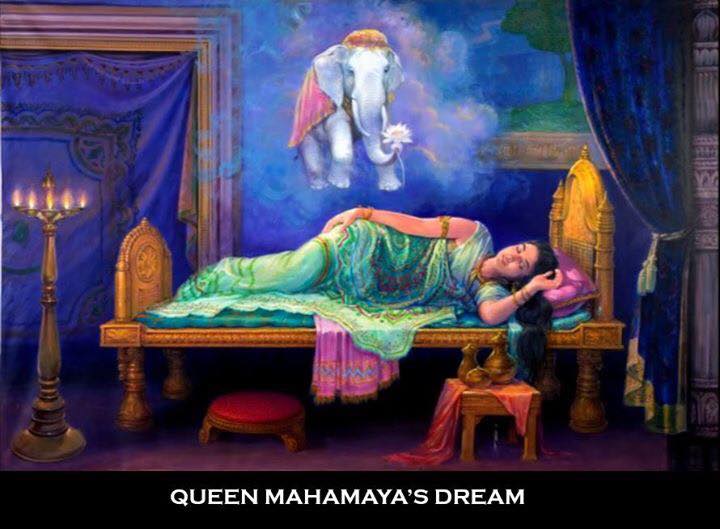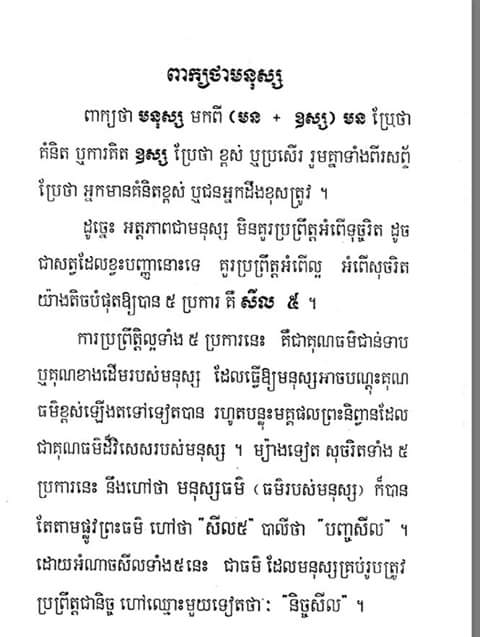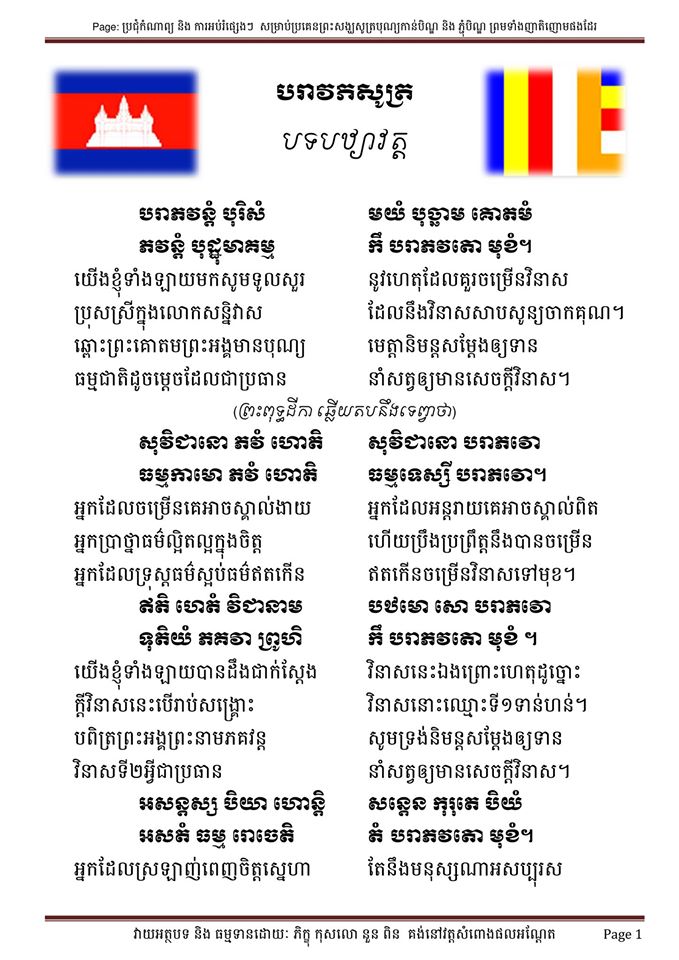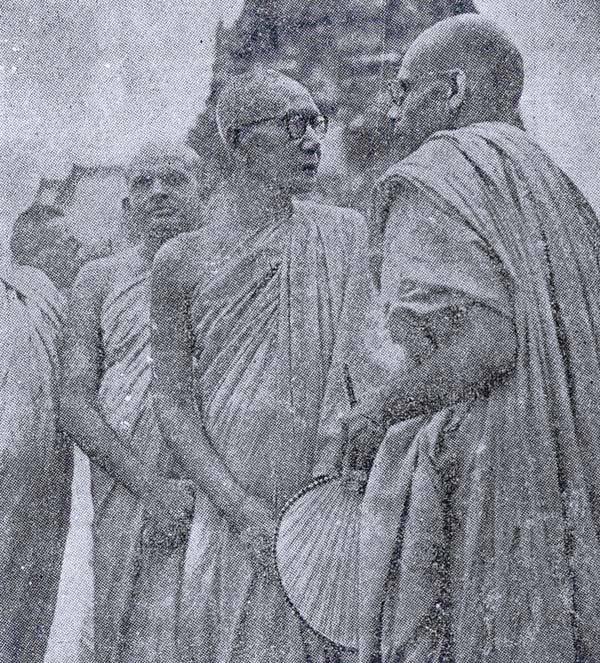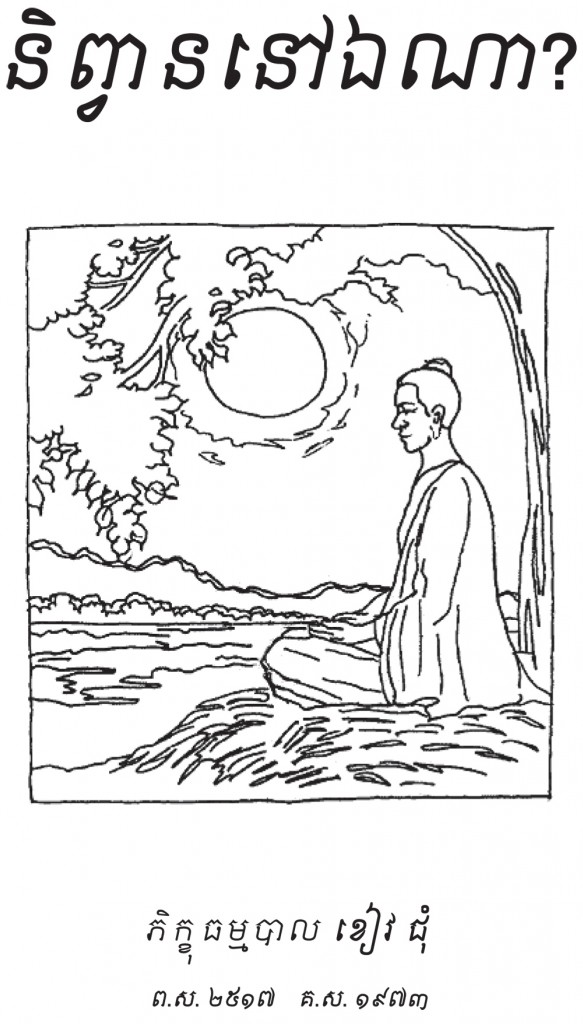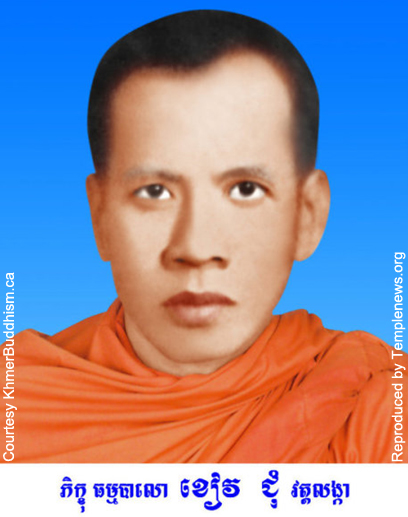Three marks of existence
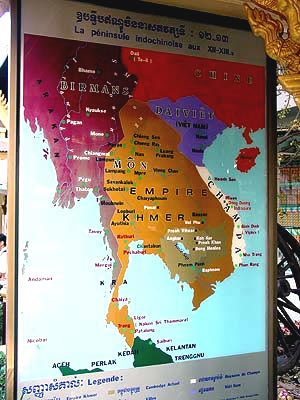 សព្វេសង្ខារាអនិច្ចា
សព្វេសង្ខារាអនិច្ចា
សព្វេសង្ខារាទុក្ខា
សព្វេធម្មអនត្ដា
វត្ថុទាំងឡាយពុំមែនទៀង
វត្ថុទាំងឡាយពុំមែនទទួលបាននូវសេចក្ដីពេញចិត្ដ
វត្ថុទាំងឡាយពុំមែនជារបស់ខ្លួន។
Sabbe sankhara anicca
Sabbe sankhara dukkha
Sabbe dhamma anatta
All conditioned things are impermanent
All conditioned things are unsatisfactory
All things are without a self.
ISBV: Madhu Purnima Puja on SEPT. 17
ពិធីបុណ្យមធុពេញបូរណ៌មី រំព្ញកដល់ថ្ងៃដែលព្រះដ៏មានព្រះភាគបង្រៀនព្រះភិក្ខុនៅកុសម្ពីសាមគ្គីគ្នាឡើងវិញ
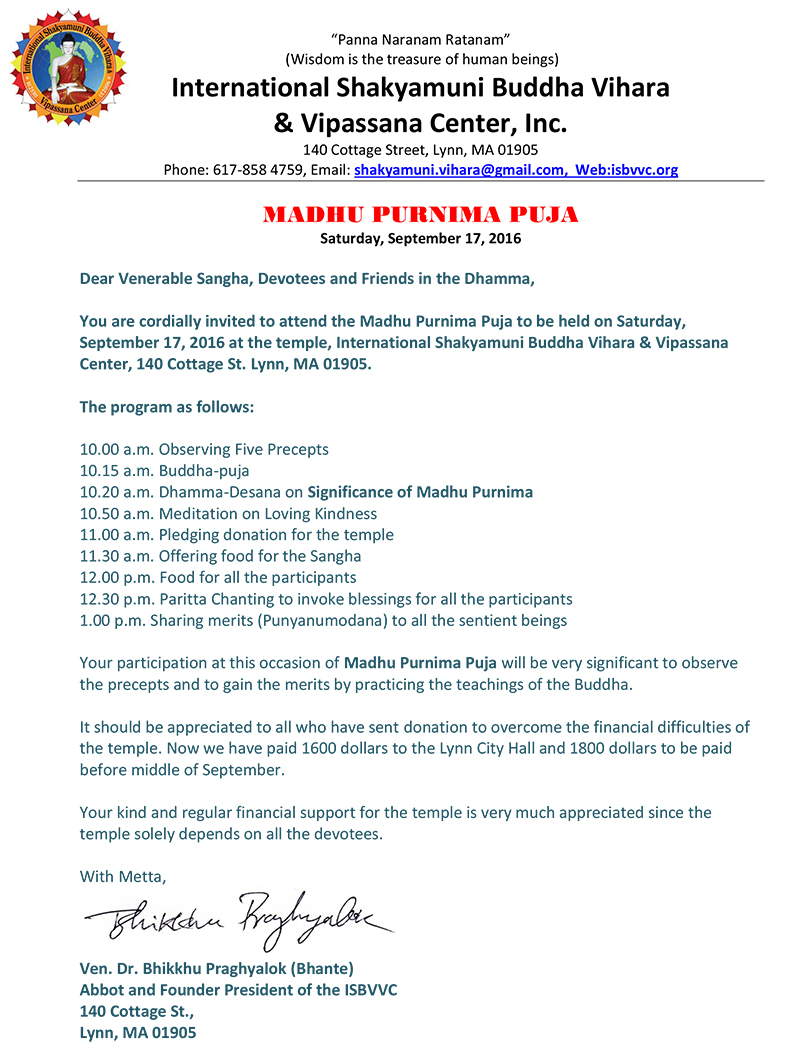
Modhu Purnima is a Buddhist festival celebrated in Bangladesh, especially in the region of Chittagong. It occurs on the day of the full moon in the Bangla month of Bhadro (August/September).
The day commemorates an occasion on which the Buddha retreated to the wilderness of Parileyya forest to bring peace between two quarrelling factions of disciples. According to legend, a monkey and an elephant named Parileyyaka fed him during this time, the elephant bringing fruit and the monkey bringing a honeycomb. The monkey was so excited when the Buddha accepted his gift that he began leaping from tree to tree and fell to his death. However, he was immediately reborn in Tavatimsa as a result of his generosity.
On this day, the Bhikkhus of Kosambi ended the disunity in their ranks and went to the Buddha in the forest to take a vow of unity and cooperation. In his sermon, Buddha pointed to the elephant and said, “This elephant lives alone in the forest in the absence of a proper partner. If you do not get associates with wisdom and high thoughts, it is better to live alone in this world, for foolish associates will only increase your suffering.”
After the rains retreat the monks who had split into two groups agreed to make up their differences because the local lay people were not making any offerings to them. The monks sent a representative to see the Buddha and invite him to go back to the city. The elephant palilayaka was heartbroken to see the Buddha go, and followed him out of the forest, and even made as if he would follow the Buddha into the city. The Buddha turned to him and said, “Palilayaka. This is the limits of your territory. From here on is the territory of man, which are a great danger to animals such as you. You cannot come with me! Palilayaka the elephant stood and roared in grief, but did not dare follow the Buddha. As soon as the Buddha was out of sight, his heart broke and he died right there. The texts state that the elephant and the monkey, after dying at that time, were reborn as devas in the Tavatimsa heaven.
Modhu Purnima is celebrated as a joyous day of unity and charity. All Buddhists observe it by bringing gifts of honey and fruit to shrines or monasteries. Text courtesy Wikipedia
Namaskar and Observing Five Precepts
ធម៌នមស្ការ និង សមាទាននិច្ចសីល បាលី-ប្រែ
Namaskar and observing the five precepts
ដោយអតីតព្រះភិក្ខុ ចន្ទវណ្ណោ អ៊ុង មាន ជាព្រះសុមេធវង្ស និងព្រះចៅអធិការវត្ដពុទ្ធិការាម នៅរដ្ឋធានី Washington, D.C.
By the late Bhikkhu Jandavanno Oung Mean, Sumedhavamsa and Chief monk of Wat Buddhikaram, Washington, D.C., United States of America
Awareness
Awareness is the path of immortality;
thoughtlessness is the path of death.
Those who are aware do not die.
The thoughtless are as if dead already.
The wise having clearly understood this,
delight in awareness
and find joy in the knowledge of the noble ones.
These wise ones, meditative, persevering,
always using strong effort,
attain nirvana, the supreme peace and happiness.
If a person is awake, aware, mindful, pure, considerate,
self-restrained, and lives according to duty,
that person’s glory will increase.
By awakening, by awareness, by restraint and control,
the wise may make for oneself
an island which no flood can overwhelm.
Fools follow after vanity, are ignorant and careless.
The wise keep awareness as their best treasure.
Do not follow after vanity
nor after sensual pleasure nor lust.
Whoever meditates with awareness obtains great joy.
When the wise conquer thoughtlessness by awareness,
climbing the terraced heights of wisdom,
free from sadness viewing the sad crowd below,
they gaze upon the fools, like one on the mountain peak
gazes upon those standing on the plain.
Aware among the thoughtless, awake among the sleepy,
the wise advances, like a racehorse leaves behind the slow.
By awareness Indra rose to become chief of the gods.
People praise awareness; thoughtlessness is always blamed.
A mendicant who finds joy in awareness,
who looks with fear on thoughtlessness,
moves about like fire,
burning all restrictions, small or large.
A mendicant who finds joy in awareness,
who looks with fear on thoughtlessness,
cannot fall away, but is close to nirvana.
~The Dhammapada
Our journey for peace
Our journey for peace
begins today and every day.
Each step is a prayer,
Each step is a meditation,
Each step will build a bridge.
~Maha Ghosananda
Meditation
by Ajahn Chah
To meditate you do not have to think much more than to resolve that right now is the time for training the mind and nothing else. Don’t let the mind shoot off to the left or to the right, to the front or behind, above or below. Our only duty right now is to practice mindfulness of the breathing. Fix your attention at the head and move it down through the body to the tips of the feet, and then back up to the crown of the head. Pass your awareness down through the body, observing with wisdom. We do this to gain an initial understanding of the way the body is. Then begin the meditation, noting that at this time your sole duty is to observe the inhalations and exhalations. Don’t force the breath to be any longer or shorter than normal, just allow it to continue easily. Don’t put any pressure on the breath, rather let it flow evenly, letting go with each in-breath and out-breath.
You must understand that you are letting go as you do this, but there should still be awareness. You must maintain this awareness, allowing the breath to enter and leave comfortably. There is no need to force the breath, just allow it to flow easily and naturally. Maintain the resolve that at this time you have no other duties or responsibilities. Thoughts about what will happen, what you will know or see during the meditation may arise from time to time, but once they arise just let them cease by themselves, don’t be unduly concerned over them.
During the meditation there is no need to pay attention to sense impressions. Whenever the mind is affected by sense impingement, wherever there is a feeling or sensation in the mind, just let it go. Whether those sensations are good or bad is unimportant. It is not necessary to make anything out of those sensations, just let them pass away and return your attention to the breath. Maintain the awareness of the breath entering and leaving. Don’t create suffering over the breath being too long or too short, simply observe it without trying to control or suppress it in any way. In other words, don’t attach. Allow the breath to continue as it is, and the mind will become calm. As you continue the mind will gradually lay things down and come to rest, the breath becoming lighter and lighter until it becomes so faint that it seems like it’s not there at all. Both the body and the mind will feel light and energized. All that will remain will be a one-pointed knowing. You could say that the mind has changed and reached a state of calm. (more…)
Why a number of Buddhist monks do not practice meditation?
តើហេតុអ្វីព្រះសង្ឃមួយចំនួនពុំប្រតិបត្ដិសមាធិ?
Jaya Mangala
យើងធ្លាប់តែឮព្រះសង្ឃសូត្រធម៌ពាហុំ តែពុំបានដឹងថាតើនរណាជាអ្នកប្រែសេចក្តីជាពាក្យកាព្យនៃធម៌ពាហុំនេះទេ។
ប្រភព ធម្មរង្សី Dhammaraingsey
សូមទាញយកជាភាសាខ្មែរ Download in Khmer: Buddhajaya Mangala by Okhna Suttantabreychea Inda
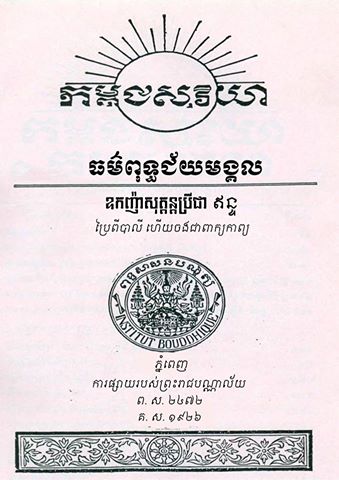
ការមិនធ្វើបាបទាំងពួង
ប្រភព ប៊ុន ចាន់សុខេន
សព្វបាបស្ស អករណំ ការមិនធ្វើបាបទាំងពួង
កុសលស្សូបសម្បទា ការញ៉ាំងកុសលឲ្យកើតឡើង
សចិត្តបរិយោទបនំ ការធ្វើចិត្តរបស់ខ្លួនឲ្យផូរផង់
ឯតំ ពុទ្ធាន សាសនំ នេះជាពាក្យប្រៀនប្រដៅ របស់ព្រះពុទ្ធទាំងឡាយ ។
Four kinds of Lasciviousness (Causes of Downfall)
អបាយមុខ ៤យ៉ាង
Four kinds of Lasciviousness (Causes of Downfall)
Meaning of the Buddhist Flag
#ដើមកំណើតរស្មីទាំង៦ពណ៌។អ្នកគេចេះសូត្រខ្លះ ត្រៀមសម្រាប់មាឃបូជាខាងមុខ
Posted by Phearun Rayuth on Tuesday, February 9, 2016
H.H. the Great Dr. Jotannano Chuon Nath
Where is Nibbana? by the late Maha Thera Kheav Chum
MEDITATION DOCUMENTARIES
DHAMMA TALK BY VEN. KETODHAMMO
ព្រះធម្មទេសនាសំដែងដោយ ព្រះធម្មវិបស្សនា កេតុធម្មោ សំ ប៊ុនធឿន
Dhamma talk by the late and renowned Cambodian Vipassana Buddhist Master Ven. Ketodhammo Som Bunthoeun.
TEMPLENEWS TV SHOWS
Watch our shows on LTC – Channel 95
Broadcast hours | Fridays: 4 – 5 pm, 8 – 9 pm
Tuesdays 11 am - 12 pm
Email: templenewscast@yahoo.com
Phone: 978.853.9623
Website: templenews.org
Youtube: www.youtube.com/templenewstv
To find out more, including how to control cookies, see here: Cookie Policy
